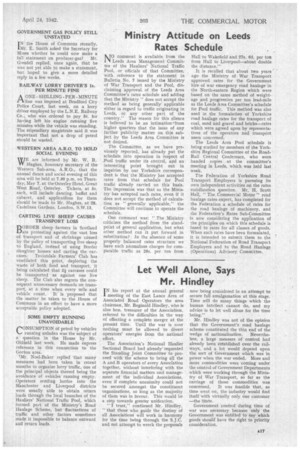Let Well Alone, Says Mr. Hindley
Page 19

If you've noticed an error in this article please click here to report it so we can fix it.
I N his report at the annual general meeting of the East Lancs Area of Associated Road Operators the area chairman, Mr. Reginald Hindley, who is also hon. treasurer of the Association, referred to the difficulties in the way of effecting a complete merger at the present time. Until the war is over nothing must be allowed to divert operators' energies from the national effort.
The Association's National Haulier Sectional Board had already. requested the Standing Joint Committee to proceed with the scheme to bring all the A and B operators of every Association together, without interfering with the separate financial matters and management of the individual Associations, even if complete unanimity could not be secured amongst the constituent organizations, so long as the majority of them was in favour. This would be a step towards greater unification,
" I trust," continued Mr. Hindley, "that those who guide the destiny of all Associations will work in harmony for the time being through the S.J.C. and not attempt to wreck the proposals now being considered in an attempt to secure full amalgamation at this stage. Time will do many things which the human intellect cannot do, and my advice is to let well alone for the time being."
Mr. Hindley was not of the opinion that the Government's road haulage scheme constituted the thin end of the
wedge of nationalization. Nevertheless, a large measure of control had already been established over the railways, and a lot would depend upon the sort of Government which was in power when the war ended. More and more commodities were coming under the control of Government Departments which were working through the Ministry of War Transport, so far as the carriage of those commodities was
concerned. It was feasible that, as time went on, the industry would find itself with virtually only one customer —the State.
Government control during time of war was necessary because only the Government was entitled to say which goods should have the right to priority consideration.




















































